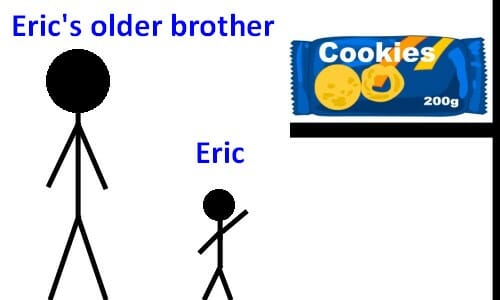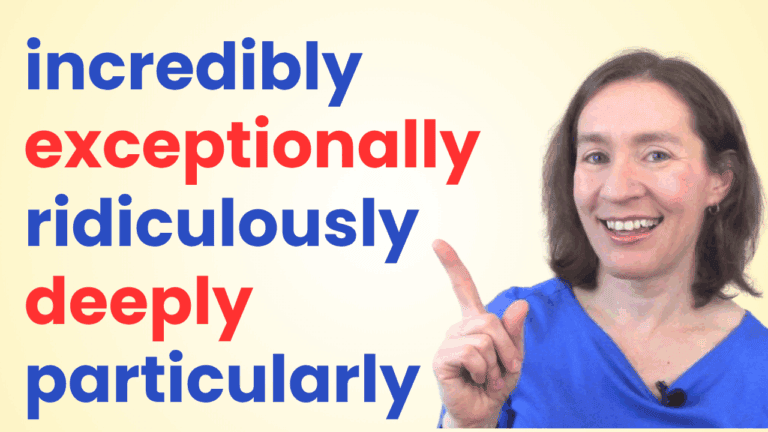Right-click each link and select “Save” or “Save as…” to download
This is a free sample lesson from the
Advanced English Grammar Course
 Today’s lesson will focus on using modal verbs for certainty, probability, and deduction.
Today’s lesson will focus on using modal verbs for certainty, probability, and deduction.
“Deduction” means using the information available to make a guess or draw a conclusion about the facts.
Depending on the information available, you might be more certain that your conclusion is true, or less certain that your conclusion is true – and we use different modal verbs to indicate the degree of certainty.
| How certain are you? | Use these modal verbs: |
| 100% – Completely or almost certain | must, can’t, couldn’t |
| 80% – Expecting to be certain | should |
| 50% – Maybe certain | might, may, could |
Let’s look at some examples.
Modal Verbs for Certainty
Certainty about the Present
When making deductions about the present, we use must if we are sure something is true and can’t if we are sure that something is impossible.

For example, if you see this guy, you can say:
- He must be a chef.
(we are very certain, because of his uniform and what he is doing) - He can’t be a policeman.
(we are very certain he is NOT a policeman)
Carla works every day from 9 AM to 5 PM. Right now it’s 10:30 AM, so…
- She must be at work.
- She can’t be at home.
Put it into practice!
You’ll see five pictures accompanied by sentences. For each one, fill in the blank with must (if you think it is true) or can’t (if you think it’s not possible).

He _____________ be a vegetarian.

They ______________ be in love.

You studied all night. You ___________ be exhausted.

That __________ be right…

She ____________ love her cat.
Certainty about the Past
When we consider some present evidence and draw a reasonably certain conclusion about what happened in the past, we use must have and couldn’t have plus the past participle of the verb.
 must have + past participle
must have + past participle
when we draw the conclusion that something DID happen
- Sheila got a tan. She must have spent a lot of time in the sun lately.
- There was one banana left, but now it’s gone. My husband must have eaten it.
must not have + past participle
when we draw the conclusion that something did NOT happen
- The car is still dirty. Paul must not have washed it yet.
- He barely touched his lunch. He must not have been hungry.
couldn’t have + past participle
when we are certain that something was IMPOSSIBLE
- Martha couldn’t have takenyour notebook; she wasn’t even in class yesterday.
- The cookies are gone. But Eric couldn’t have reached the cookies on the top shelf; he must have asked his older brother to get them.

Can’t have is also possible, but it is much less common than couldn’t have.
Here’s an example that illustrates the difference between must not have and couldn’t have:
- I don’t see the report here – she must not have printed it out.
(we draw the conclusion that she did not do it) - The printer’s been broken for the past week, so she couldn’t have printed out the report.
(we know it was IMPOSSIBLE for her to do it)
Put it into practice!
You’ll see five pictures accompanied by sentences. For each one, fill in the blank with must have (if you think it happened), must not have (if you think it didn’t happen) or couldn’t have (if you think it’s impossible).

The thief ______________________ gotten in through the window.

I _________________________ left my phone at work; I made a call on the drive home.

She __________________ been happy when she heard the good news.

They _____________________ bought a house without a loan because they had no savings.

He looks upset. He _________________________ liked whatever she just said.

“How was your presentation?”
“Great! It _______________________ been better!”
Certainty about the Future
Making deductions about the future is the same as making predictions. As you learned in the lesson about future tenses, we can use will or going to for saying what we believe will happen in the future. When you are quite sure that your prediction is correct, you can also add the word definitely to emphasize your certainty:
- She‘s definitely going to love this book – it’s by her favorite author.
- The kids will definitely be thrilled when we tell them we’re going to Disney World.
Two slightly more formal expressions that can be used for talking about the future with certainty is saying that something is certain to happen, or is sure to happen:
- Engineers are certain to develop even faster computers.
- The country is sure to come to the aid of its ally.
Modal Verbs for Expectation
Present/Future Expectation
When you expect something to happen (although you are not completely, 100% certain), you can use should/shouldn’t for the present or future:
- Present:
I took my car to the mechanic yesterday and he said the problem would be fixed in a day – so my car should be ready by now.  Future:
Future:
Can you please type up these notes? It should only take about half an hour.- Present:
The weather is clear, so our flight shouldn’t be delayed. - Future:
I’ve written out all the instructions for this task step by step, so you shouldn’t run into any problems when you try to do it.
Put it into practice!
What is one thing you expect to do or one thing you expect to happen within the next week? Create your own sentence using should:
Ex) Within the next week, I should finish the book I’m reading.
Past Expectation
For expectations about what was supposed to happen in the past, you can use should have and shouldn’t have plus the past participle:
 I sent the package three weeks ago with express mail. They should have received it already.
I sent the package three weeks ago with express mail. They should have received it already.
= I expect that they have already received it- This car is brand new. It shouldn’t have broken down.
= I expected it NOT to break down
Because should/shouldn’t are also used for giving advice and recommendations, we can also use should have and shouldn’t have for evaluating things in the past and declaring them to have been right or wrong, good or bad:
- Lindsay saw a woman who needed help, but did nothing.
“Lindsay, you should have helped her.” - I said something mean to my best friend during an argument.
“I shouldn’t have said that. It really hurt her feelings.”

Put it into practice!
Think of one thing you regret doing, and one thing you regret NOT doing. Make sentences about them using should/shouldn’t have + the past participle:
- I should have…
- I shouldn’t have…
Modal Verbs for Possibility
Present/Future Possibility
We can use may, might and could to talk about things that are possible in the present and future.
Present:
 Where’s Fred? He’s not in his office.
Where’s Fred? He’s not in his office.
He maybe in the bathroom… or he might be in the conference room.- Don’t eat that mushroom. It could be poisonous.
Future:
- The weather forecast says it may rain tomorrow.
- Your daughter is really smart. She could be very successful someday.
- We might take a road trip this weekend.
Some people say that might is less certain than may, but in spoken English there is really no effective difference. It’s probably best to use might. The word may is less common, and we can only use could in the positive form, not the negative form, for talking about possibility:
- Are you sure that’s a good idea?
The boss may not / might not like it when he finds out.
The boss could not like it when he finds out. - I may not /might not be the smartest person in the class, but I definitely work the hardest.
I could not be the smartest person in the class, but I definitely work the hardest.
Past Possibility
When talking about past possibilities, we can use… might have / may have / could have + past participle (for positive possibilities) and might not have / may not have + past participle (for negative possibilities).
Positive Past Possibilities:
 She’s not home. She might have gone to the store.
She’s not home. She might have gone to the store.- He may have misunderstood you when you talked to him yesterday.
- The person who stole the documents could have been one of the employees.
Could have is usually used in unreal conditions – when we are imagining a possibility if something in the past had been different: “If we had started this project earlier, we could have finished on time.”
Negative Past Possibilities:
- John’s not here. He might not have known about the meeting.
- If she hasn’t called you back, she may not have listened to your voicemail yet.
Remember that couldn’t have is only used when we are certain that something is logically impossible in the past:
- She couldn’t have taken the car; she doesn’t have a key.
Summary
- Use must (present) and must have (past) when you are very certain that something is/was true
- Use can’t (present) and couldn’t have (past) when you are very certain that something is/was impossible
- Use should/shouldn’t (present) and should have / shouldn’t have (past) to talk about things you expect to be true, although you don’t have complete certainty
- You can also use should have / shouldn’t have for judging actions in the past to be good or bad
- Use might (most common), may, or could to talk about present and future possibilities
- Use might have, may have, or could have to talk about past possibilities
- For a possibility that something did NOT happen, use might not have and may not have
Learn more: State verbs and action verbs



 Future:
Future: I sent the package three weeks ago with express mail. They should have received it already.
I sent the package three weeks ago with express mail. They should have received it already. Where’s Fred? He’s not in his office.
Where’s Fred? He’s not in his office. She’s not home. She might have gone to the store.
She’s not home. She might have gone to the store.







